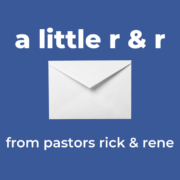a little r & r

A small boy, after being tucked into bed for the night cried out, “Mommy, I’m afraid to be alone in the dark. I want somebody to stay with me.” His mother replied, “Don’t be afraid. God is with you.”
The little boy then added, “I want somebody with skin on his face.”
Up until the Holocaust & WWII in the 1930’s and 40’s the central question people asked was “Who is God.” No more. Since then, the central question people ask is “Where is God?”
In John, Jesus answers “I will not leave you orphaned.” Jesus’ last words in Matthew are, “Lo, I am with you always.” Both gospels announce God is always with us, no matter what. God is omnipresent, ubiquitous, everywhere!
But when tragedy strikes any of us, the temptation is to doubt Jesus’ promises of God being here for us. It’s easy to be glib that God is with us when all is going well. But a tour through the hell of grief tests our certainty. Grief tests our faith more than anything else.
And, frankly, death and despair can lead us in opposite directions. Many folks will understandably deal with the grief by defaulting quickly to the position that their loved one’s death was “God’s will.” I’ve heard countless people say this. This default position brings them comfort.
But when people assign their tragedy or loss to God’s will they don’t realize they are implying God caused their suffering. They don’t realize they are implying God is the cause of evil in their life. It’s like evangelist Pat Robertson 20 years ago saying, “9/11 was an act of God’s will to punish America for accepting homosexuality.” I wonder if he ever really thought through the awful theological implications of his statement. I doubt it.
On the other hand, there are those who in their anger and anguish give up on God entirely because they feel God was behind their loved one’s death. They blame God for their suffering and give up on God. They abandon any belief in God and become atheists, a word which quite literally means “without God.” This is not to be confused with “antitheism,” which is antagonism against God, though their new-found hostility to God comes pretty close to this. But they proceed to live their lives as though God is dead and never existed. They often become atheists, people who write God out of their heart and minds.
So, where is God when things go bad?
A few weeks ago, René mentioned the little-known word “Paraclete,” another word for the Holy Spirit in her sermon. She pointed out Paraclete also means “Advocate” and “Comforter.” She said that the people who surround us with their love and comfort at a time of loss are like the Paraclete. They are our advocates and comforters.
Well, the little boy who wanted “somebody with skin on” probably makes us think of Jesus. He is the Gospel of John’s “Word made flesh.” He is Isaiah’s “God-with-us.” He is God’s skin in the game of our life and our world.
We have heard these phrases so often we may have become immune to their impact. We’ve become so accustomed to hearing them, their power is lost on us. Because the idea that God chose to humble Godself to share our humanity, to be human as well as divine, is truly radical and amazing! God becoming a flesh and blood human in Jesus means God has come to us “with skin on.”
Ultimately, when God became a human being in Jesus, God really complimented our humanity. When God became human in Jesus God showed how deeply God cares for us, sharing our wounds and our grief.
And this very fact changes how we see ourselves and others as not merely human, but the presence of the divine, of God, in our midst!
Yet, if you are like me, there are too many days I fail to see how people embody the very presence of God. They incarnate God and make us realize God isn’t far away, but near to us. I just don’t see their divinity when I should, with the result I get too easily caught up in the despair and chaos of our times. My hunch is you do too.
And when, on those rare occasions I take a deep breath and pause to understand how near God has chosen to be to us, I become what all of us Christians ought to be: “panentheists”! Not “pantheists” who believe God is all things, but “panentheists,” with the understanding that God is with-IN all things! Notice the two little letters “e” and “n” that distinguish the word “panentheism from “pantheism.” They are key in recognizing how present God is to us.
An unexpected experience occurred for me with the on-set of COVID which reminded me how much God is IN all things.
Soon after COVID-19 struck and staying-in-place, with so much time at home, set in, René and I put up a bird feeder we’d purchased many months before. At the same time, we bought a book about “Birds in Kansas” so we could identify our feathered visitors.
It didn’t take long before we were being amazed by visits from cardinals, doves, Carolina wrens, woodpeckers, chickadees and so on. We found such joy seeing them and noting in the book those we were seeing, we bought and put up a second, different kind of feeder when gold finches and other small birds started visiting. Finally, we got a hummingbird feeder and delighted seeing them right outside our kitchen window.
I credit these birds and the joy of doing something positive for creation by putting up the feeders that I felt their presence as a gift to me. They reminded me how God is all around us IN the nearly infinite forms of creation we take for granted every day. The birds reminded me that God is also in every person, many of whom have no awareness that God is within them!
So, when we grieve, God comes in the ordinary, everyday form of friends and family and even strangers who color our lives with God’s boundless hope and love. They are “little Christs,” as Protestant reformer Martin Luther would say. They are the Paraclete, our advocate and comforter, the Word Made Flesh, the spirit of Christ all about us and, yes, in us.
You see, our world is chocked-full of God’s presence: in the birds, in the trees, in the skies, in the earth and in the flowers, in us everywhere. All because God wears all kinds of skin in all kinds of colors and variations.
“Where is God?” we ask? God is everywhere! The real question is: Are we paying attention?
Blessings! Rick



